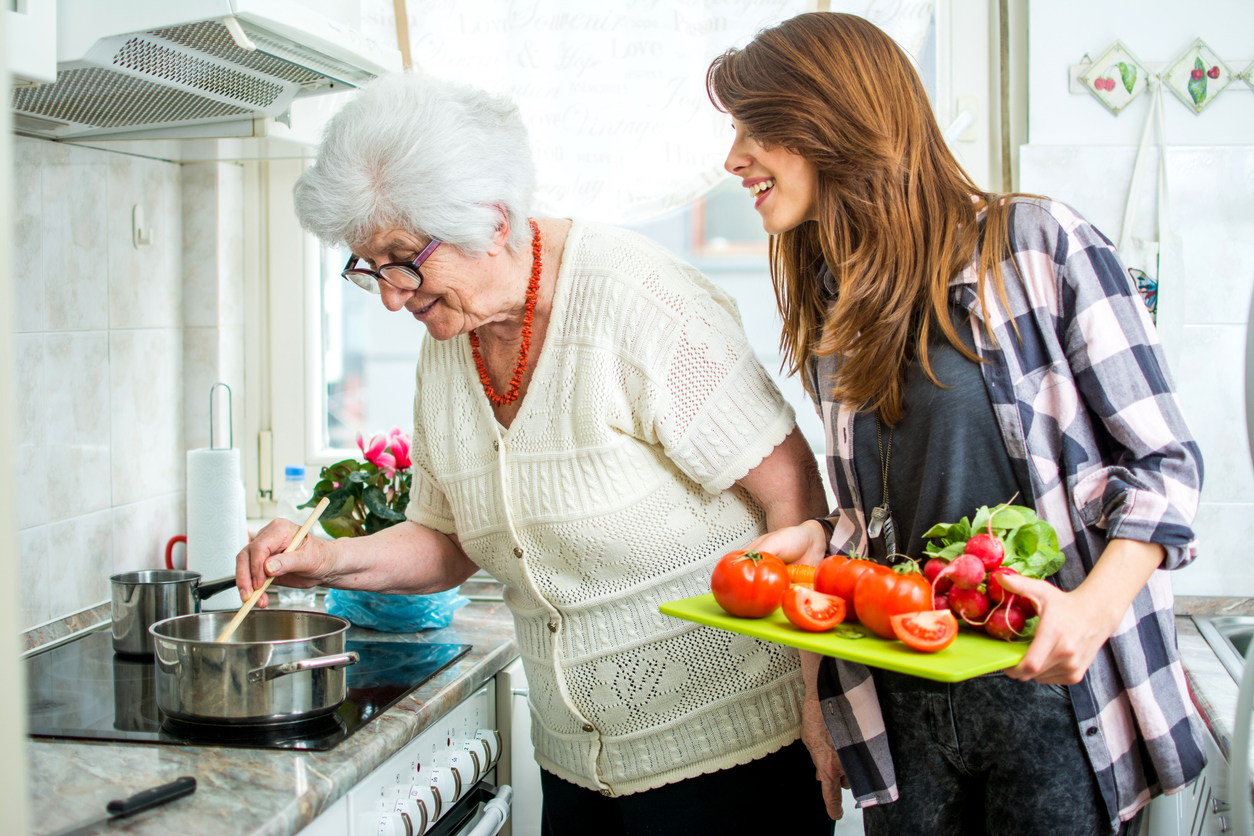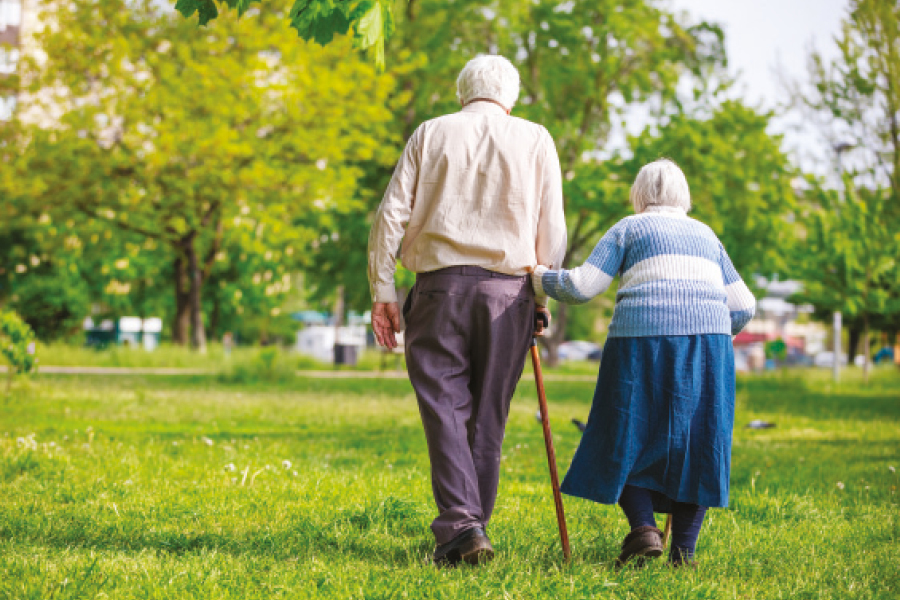As people get older, it’s really important to look after what they eat and drink. A nutritious diet and plenty of water help to keep us healthy and happy. This can prevent a lot of problems that often affect older people. If someone has health issues like dementia, we need to pay even more attention to their food and water intake as it can affect their ability to manage it independently.
Eating well and staying hydrated keeps our loved one’s feeling strong, alert, and comfortable. It also helps to avoid health troubles like infections, tiredness and confusion.
The Benefits of a Nutrient-Rich Diet for Older People
Eating well is key to staying healthy, especially as we get older. A diet rich in nutrients – full of vitamins, minerals, protein, and the right kind of energy – does wonders for an older person’s health:
Strength and Mobility: Eating well helps maintain muscle strength, which is so important for keeping mobile.
A Strong Immune System: A balanced diet keeps the immune system strong, helping to ward off colds, infections, and other illnesses that can be tougher on older bodies.
Speedy Healing: If an older person does get ill or has an injury, a good diet can help them heal quicker and get back on their feet.
Healthy Bones: Strong bones are vital as we age, and the right nutrients help keep bones healthy, reducing the risk of fractures.
Mental Sharpness and Emotional Health: Eating well isn’t just about physical health. It also plays a huge part in keeping the mind sharp and emotions balanced.
However, it’s not always easy for older adults to get all the nutrition they need. They might not feel as hungry as they used to, or medication side effects can make food less appealing. Sometimes, dental issues or a change in taste can make eating a challenge. These hurdles mean they might not get all the nourishing food they need, which can make other health problems worse.
Why Hydration is Just as Important
Staying hydrated is another key part of staying healthy, but it’s something we often forget about. As people get older, they might not feel as thirsty, but their bodies still need plenty of fluids. Drinking enough water helps keep the body working as it should, prevents dehydration, and can even affect mood and cognition.
Together, good nutrition and proper hydration form a foundation of health for older adults. They help maintain physical strength, mental clarity, and overall well-being, contributing greatly to their quality of life.
How Common Conditions Impact Nutrition and Hydration in Older Adults
As people grow older, they may face various health challenges that affect their nutrition and hydration. It’s important to understand these conditions, as they can significantly influence their ability to manage a healthy diet, impacting their overall health and happiness.
- Dementia: Often leads to forgetting meals, and individuals may not recognise when they’re hungry or thirsty. Careful monitoring and reminders are needed for regular eating and drinking.
- Parkinson’s Disease: This can cause difficulties with self-feeding and swallowing due to tremors and coordination issues. These challenges may require adaptive cutlery and altered food consistency to help maintain a balanced diet.
- Stroke: May result in dysphagia (difficulty swallowing). This can require diets with softer or pureed foods and sometimes special thickened drinks.
- Diabetes: Managing diabetes involves balancing diet, medication, and physical activity. Dietary choices need to be tailored to maintain stable blood sugar levels, with a focus on regular, nutritious meals.
- Heart Disease: A diet low in sodium and rich in heart-healthy foods is essential. Attention to diet helps manage symptoms and promotes overall cardiovascular health.
- Arthritis: Joint pain and reduced mobility can complicate food preparation and consumption, impacting the ability to maintain a balanced diet. Ergonomically designed kitchen tools and easy-to-prepare meals can help.
Recognising and addressing these challenges is important so we can provide effective care, ensuring they receive the right nutrition and hydration to maintain their health and well-being.
Supporting our Client Living With Dementia
An example of this is one of our clients with dementia who had a difficult time keeping up with their water intake. Health setbacks had resulted in hospital admission. After discharge from hospital, their general health and mobility had declined, so a focus on good nutrition and hydration was crucial for their recovery.
However, living with dementia made it difficult for our client to remember or understand the need to stay hydrated. Our Caregivers recognised that a dignified, understanding approach was required. Just reminding our client to drink water wasn’t enough; we had to ensure that encouraging hydration became a regular part of their care and support, while always being mindful and respectful of their cognitive condition.
Our visits became much more than routine care. Our Caregivers built strong bonds and used their time to encourage our clients to drink, always doing so in a dignified and respectful way that supported their independence.
Over time, we began seeing positive results. Our client began to drink independently more frequently, which helped improve their overall health and mobility. As well as regaining their physical strength, we noticed the positive difference this made to their overall happiness.
This experience highlighted how important it is to tailor and adapt our care plan, especially for someone living with dementia. It’s not just about physical health but also understanding and meeting their emotional and cognitive needs.
Simple Tips for Eating Well and Staying Hydrated
Taking care of an older loved one’s nutrition and hydration is vital, but it doesn’t have to be complicated. Here are some straightforward and caring tips to ensure they’re well-nourished and hydrated:
Easy Ways to Keep Them Hydrated
Keep Drinks Close By: Place water and other beverages within easy reach, like a water bottle next to their favourite chair.
Offer Flavourful Options: Mix it up with herbal teas, infused water, or diluted fruit juices to make hydration more appealing.
Recognise Dehydration Early: Watch for signs like dry mouth or increased tiredness, and respond promptly.
Promoting nourishing food
Diverse and Healthy Meals: Ensure meals are varied, including fruits, vegetables and lean proteins, to provide a mix of necessary nutrients.
Soft, Easy-to-Eat Options: If chewing is a challenge, offer softer foods or blended meals that are both nutritious and easy to eat.
Enjoyable Mealtime Atmosphere: Make meals more than just eating. Set a nice table, engage in conversation, or play some gentle music to enhance the experience.
Other Ways to Promote Good Nutrition and Hydration
Routine Matters: Having a regular mealtime schedule can provide comfort and consistency.
Use Mealtime for Socialising: Encourage conversation during meals to keep the atmosphere light and engaging.
Tailor to Their Preferences: Pay attention to your loved one’s likes and dislikes, adapting meals and drinks to suit their tastes and needs.
By implementing some simple changes, you can make a big difference in the daily life and wellbeing of those in your care. It’s not just about the food and drink but also about the care, attention, and love you bring every interaction.
At Unique Senior Care, we’re dedicated to providing personalised, empathetic care for each of our clients. Understanding and meeting their individual needs, especially in areas like nutrition and hydration, is at the heart of what we do. We’re passionate about making a real, positive difference in the lives of those we care for.
If you have questions about an older person’s care or are seeking support, please reach out to us. We’re always happy to offer guidance, share our expertise, and help ensure the best possible care for your loved ones. Whether you need some advice on improving a loved one’s diet or want some ongoing help with their care, our team is just a call away.
With a background spanning over two decades in the field of marketing, I have had the privilege of working across diverse industries, ranging from insurance to sports, technology, and health & well-being.
While my previous experience did not directly involve care services, I have acquired a deep understanding of the sector’s needs and challenges through my wife. For the past eight years, she has been dedicated to providing the highest level of support to her clients as a compassionate caregiver.
Witnessing the profound impact that committed caregivers have on their clients’ lives when the opportunity arose to join the esteemed team at Unique Senior Care, it was an easy decision for me to make.
During my free time, you may find me leisurely strolling across fields with a metal detector in hand, eagerly exploring the possibility of unearthing hidden treasures. Alternatively, I love nothing better than making the most of our National Trust membership and cherishing precious moments spent with my family.
I am genuinely thrilled to be a part of the Unique Senior Care team, where I can bring my expertise to the table and share a sincere passion for enhancing the lives of those we serve.






